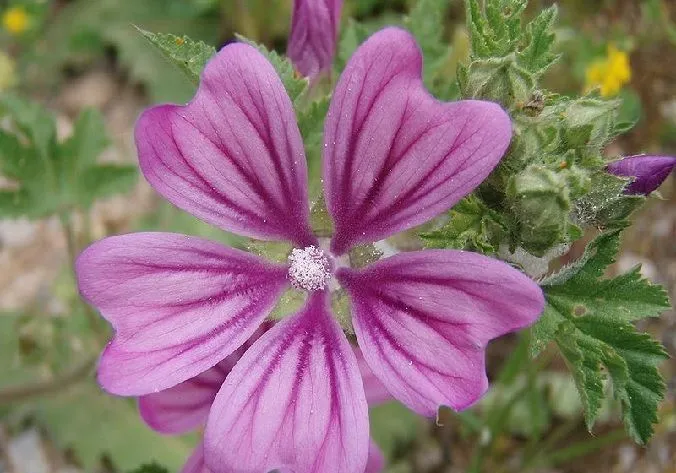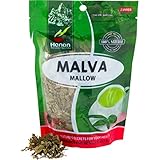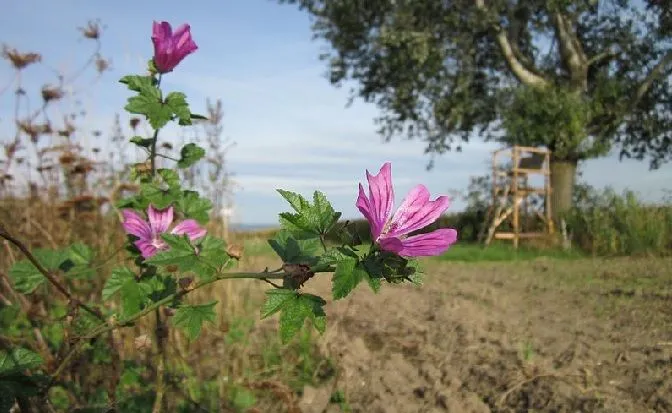The mallow (Malva sylvestris) is a biennial herbaceous and perennial plant up to 1.5 m tall. Its stem is very hairy and woody. The root is fusiform. Flowers are pink or purple with darker purple veins. The fruit, which is disc-shaped, decomposes after ripening.
It is distributed in most of the planet, as it easily adapts to different types of soils. The main advantages of mallow they are in the flowers and leaves.
The plant is native to the Southern Eurasia region. Today it can be found in subtropical latitudes around the world.
Table of Contents
Used parts of mallow
Flowers and leaves. Large young leaves that are not infected by the rust fungus (a common ailment for this plant) can be used in herbal medicine and as food.
Edible parts: leaves (both raw and cooked. Mucilaginous with a pleasant mild taste. It acts as a thickener for soups and broths.
The young leaves they also make a very suitable substitute for lettuce in a salad.
Immature seeds. They are eaten as is. The seeds have a pleasant nutty taste, but they are too complicated for most people to get (by quantity).
Flowers. Added to salads or used as a garnish. A mild and pleasant taste, with a texture similar to leaves, make a pleasant and distinct addition to the salad. The leaves can be used as substitutes for tea.

Plant propagation
- Multiplication by seeds.
Sow in early spring. Germination takes place in the following 2 weeks.
Content and active ingredients of Mallow
- The mucilage of uronic nature (10-15% in flowers, leaves 8-10%).
- Anthocyanosides (7%): Malvín.
- Tannins.
- Vitamins A, B1, B2 and C.
Medicinal properties attributed to Malva sylvestris
Among the properties of mallow are the following:
- Emollient effect, anti-inflammatory, antitussive, laxative, slightly diuretic.
- It is indicated in cases of flu, colds, pharyngitis, emphysema, asthma.
- Constipation, gastritis, ulcers, diarrhea, oliguria, cystitis, obesity.
- In topical use: glossitis, stomatitis, oral canker sores, vulvovaginitis, blepharitis, conjunctivitis, wounds, abscesses, boils, insect bites, etc.
When purchasing Mallow, you must choose between caffeinated or caffeine-free options. Both products are excellent, but the ultimate decision lies with the user.
- Loose Leaf Tea – 1.1 ounces (30 grams) of Malva / Mallow / Ebegumeci / Mealwe herbs
Contraindications you should know
We are lucky! No contraindications have been reported in relation to the current uses given to mallow. However, alcohol-based preparations are not recommended for oral administration to children under 2 years of age.
Some publications stated that pregnant or breastfeeding women should avoid the consumption of mallow, but there are no studies that confirm whether this medical plant is safe or not for use during pregnancy.
At the moment, the appropriate dose range for the common mallow As an herbal medicinal use has not been established and probably depends on factors such as age, user health and physical conditions. For the proper dosage consult with a specialist.
Some uses that we can give to the mallow…
Internal uses:
- Infusion: one teaspoon per cup. Boil for two minutes and infuse for ten. Four or more times a day.
- Andxfluent xtract (1: 1) stabilized: one teaspoon, two or three times a day, with the infusion.
- Syrup (5% fluid extract): 1-3 teaspoons daily.
External uses:
- Decoction: 30 to 50 g / l boiling for 15 minutes. Apply in the form of compresses, washes, eye baths (isotonizer), mouthwashes, gargles, vaginal washes.
- Hot poultices of mallow leaves with flax flour, for abscesses and boils.
- Mallow Juice (fresh plant) against insect bites.
The mallow also pIt can be consumed as food, in salads mixed with other vegetables. In addition to its medicinal properties, it is a plant very rich in vitamin A, B, C and E. The liquid that results from boiling a handful of flowers is also a good facial tonic.



